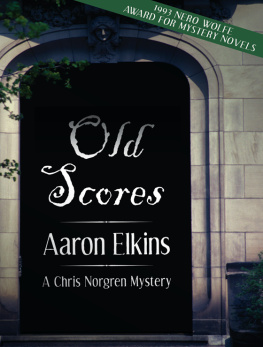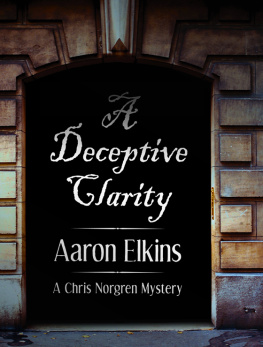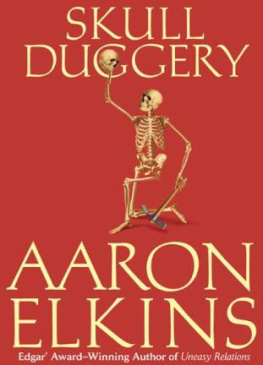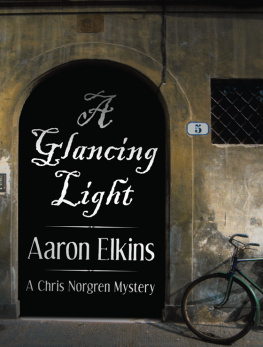Aaron Elkins - Good Blood
Here you can read online Aaron Elkins - Good Blood full text of the book (entire story) in english for free. Download pdf and epub, get meaning, cover and reviews about this ebook. genre: Detective and thriller. Description of the work, (preface) as well as reviews are available. Best literature library LitArk.com created for fans of good reading and offers a wide selection of genres:
Romance novel
Science fiction
Adventure
Detective
Science
History
Home and family
Prose
Art
Politics
Computer
Non-fiction
Religion
Business
Children
Humor
Choose a favorite category and find really read worthwhile books. Enjoy immersion in the world of imagination, feel the emotions of the characters or learn something new for yourself, make an fascinating discovery.

- Book:Good Blood
- Author:
- Genre:
- Rating:3 / 5
- Favourites:Add to favourites
- Your mark:
- 60
- 1
- 2
- 3
- 4
- 5
Good Blood: summary, description and annotation
We offer to read an annotation, description, summary or preface (depends on what the author of the book "Good Blood" wrote himself). If you haven't found the necessary information about the book — write in the comments, we will try to find it.
Good Blood — read online for free the complete book (whole text) full work
Below is the text of the book, divided by pages. System saving the place of the last page read, allows you to conveniently read the book "Good Blood" online for free, without having to search again every time where you left off. Put a bookmark, and you can go to the page where you finished reading at any time.
Font size:
Interval:
Bookmark:
Good Blood
Aaron Elkins
PROLOGUE
The Village of Stresa, Lake Maggiore, Italy,
September 7, 1960
Domenico de Grazia was a gentleman of the old school, a refined and courtly patrician, a man of breeding, poised and self-assured. Many of the simpler folk, out of respect for his lineage and his impeccable bearing, still spoke of him as il conte, the count, although the nobility had been abolished more than fifteen years before. And some took their hats off when he passed, but this was a practice he gently discouraged.
Despite his reputation, Domenico knew himself to be a shy man, uncomfortable with intimacy and easily embarrassed. At this moment he was finding it impossibly hard to make the proposal that had brought him to the modest apartment of Franco and Emma Ungaretti. For half an hour he had sat in their living room making stilted small talk, while they plainly wondered, with many glances between them, what had brought him there. Emma was his niece, his brother Cosimos only child. Franco was her husband, whom Domenico employed, out of an admittedly grudging charity, as a part-time gamekeeper on the de Grazia estate.
It was not often that Domenico visited them, although once upon a time, and not so long ago at that, he had doted on Emma. But Franco Ungaretti he could barely force himself to tolerate. Emma was such a pretty, good-natured girl too; to think of the husbands from whom she might have had her choice but that was neither here nor there.
With his second glass of Amaretto (which he detested) came the resolve he needed. He put down the glass and took a deep breath. My children, he said-and immediately regretted the choice of words, given the strange proposition he was about to make-as you know, my wife has recently suffered a second miscarriage-
Emma began to murmur something, but Domenico, determined to carry on now that he had gotten started, talked over her. -and Dr. Luzzatto has told us she can risk no further pregnancies.
More sympathetic murmurs, from both of them.
Thank you, please let me finish. As you also know, the de Grazia family has maintained its holdings and its place in the life of our beloved Italy for over six hundred years, from the days of the Dukes of Piedmont.
Yes, Uncle, Emma said.
Good. He patted her hand, but quickly drew his own back as if hed touched a flame. That had been another bad idea. I am sure you will both agree that there must always be a de Grazia to continue the heritage of our family, and to-and so forth. He was already losing them. Emma looked confused and Franco was alternating between smirking at what he no doubt considered empty platitudes, and watching a bicycle race on the muted television set in a far corner. The set had been Domenicos second-anniversary present to them a year earlier.
He decided to skip the middle paragraphs of his prepared speech. I must have an heir, he blurted. In that regard I come to you-
But you have an heir, Uncle, Emma said. Your daughter. Francesca.
Emma had many fine traits, but a piercing intelligence was not among them. Francesca is the dearest of children, the darling of my heart, Domenico explained kindly, but I must have a male heir; someone to take my place someday, someone to carry on the name.
Oh. But you could adopt someone, couldnt you?
I could, yes, and Ive given the idea a great deal of thought.
At this, Francos head swiveled from the television. Bored and noncommittal till now, his face suddenly shone with anticipation? Hope? Did this parasite think Domenico was going to make him his heir? What, adopt him? The mere thought was enough to make Domenico shudder.
Franco Ungaretti had been an Olympic silver medalist, a famous skier of breathtaking speed and daring, and as handsome as a movie star to boot. Il Valangone, the Avalanche, they had called him. But this Avalanche had also been an uneducated lout, the son of a laborer who was the son of a laborer: an ignorant, self-centered womanizer blessed with a native ability to manufacture a smooth, superficial patter that the media had been in love with. Emma, like so many other innocent young girls, had fallen under the spell of his shallow charms, and it had been her everlasting misfortune to be with him the night that he got drunk enough to decide to make an honest woman of her and get married.
Less than three months later he had been struck by an automobile. Several vertebrae in his neck had been crushed, and his sports career-and all the fame and endorsements that came with it-was over. Most athletes, so Domenico understood, put on weight when their athletic careers came to an end. But Franco had lost it. At thirty-three, with his neck now permanently askew, he was a wizened, bitter old man, all sinews and grinding tendons, and the smooth patter was a thing of the past. All that was left from before was the selfish, narrow lout that was, and had always been, the essential Franco Ungaretti. And still, Emma adored him. Love, the old proverb said, was like food or music; there was no accounting for taste.
But adoption is of no interest to me, Domenico continued. What good is an heir without the splendid genes of our family? It isnt only the de Grazia name that must go on, but the good de Grazia blood that runs through our veins and has made us what we are.
Good blood, Franco echoed, looking interested. Thats very important. Beef-brained he might be, but there was a streak of cunning in him; even if he didnt know what was going on, he could smell advantage to himself at five kilometers. Well, he was right enough about that.
Therefore, Domenico said, I have a proposition to make to you. This was the part that he had rehearsed again and again, but now he rushed clumsily through it, addressing neither of them in particular, with his eyes fixed on the coffee table. I would like Emmas consent, with Francos approval, of course, to be the bearer of my child-his face was burning-by means of a process-very impersonal, very proper, performed by a qualified physician-of of artificial insemination. This would, it goes without saying, involve no contact between us. I would, of course, expect to repay you-both of you-generously-for the inconvenience it would cause.
Emma, shocked, covered her mouth and stared at him. Francos eyes narrowed. The congealed gears of his mind were beginning to move, however slushily.
The child would be brought up as my own, my own and Stefanias, Domenico said hurriedly, speaking to Emma. No one but Stefania and I and the two of you would know the truth.
Uncle! I, I- She was blushing furiously.
How would that work? Franco asked. That no one would ever know the truth?
How perfectly Domenico understood Francos mind, so true to its owners class. If there was profit in it, he was interested, but first he needed assurance that his own cherished manhood-his most prized possession-would suffer no slurs. Domenico was ready with his answers. Emma would go to a small village up in the mountains.
Gignese, a pleasant place with a good climate. I have contacts there, and Dr. Luzzatto would always be within easy reach. She would have a fine villa and be cared for in luxury, anything she wished. A maid, a cook. Franco, you could go with her. A nice vacation, why not? Only after the baby was born would she return to Stresa. People would be told that she had become ill with tuberculosis and had gone to a sanatorium in Switzerland. No one would know, I promise you.
Thats all very fine, Franco said. But what about your wife, what about Stefania? Suddenly, without a pregnancy, she has a baby? How could that be explained?
That will present no problem. No one knows about my wifes latest
He faltered. Answering this oafs rude questions about the most intimate details of his life took more willpower than hed anticipated, but what choice did he have? about her latest miscarriage, he continued. However, everyone-the family, our friends, the servants-knows about the first one. So, like Emma, Stefania will go away for a while. It will be explained that, in order to insure against a recurrence of her difficulties, she has gone to a maternity rest home near Venice, where she can be professionally cared for at all times while she awaits the arrival of her baby. When she returns home, she will have the infant with her.
Font size:
Interval:
Bookmark:
Similar books «Good Blood»
Look at similar books to Good Blood. We have selected literature similar in name and meaning in the hope of providing readers with more options to find new, interesting, not yet read works.
Discussion, reviews of the book Good Blood and just readers' own opinions. Leave your comments, write what you think about the work, its meaning or the main characters. Specify what exactly you liked and what you didn't like, and why you think so.




